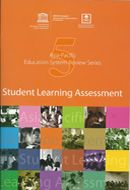Publications
Educational Books

學校改進:理論與實踐
趙志成、何碧愉、張佳偉、李文浩 著
內容簡介
2000年前後,香港社會及教育環境經歷重大變化,吹響了要求學校更新、變革的號角。為提供更優質的學校教育,以裝備學童迎接新世代的挑戰,本地學校教育工作者紛紛探問「好學校」之道。香港中文大學教育學院及香港教育研究所自1998年起推動連串全面學校改進計劃,與學校攜手探索,從不斷實踐中逐步開拓出學校改進的路徑。本書回溯過去十多年優質學校改進計劃於香港推動學校改進的經驗,內容涵蓋學校改進理論、教育政策與學校教育發展、大學與學校協作模式、學校改進個案等,總結計劃透過行動所積累的實踐知識,嘗試為本地學校的改進之路添上一磚一石。
作者簡介
趙志成現為香港中文大學香港教育研究所優質學校改進計劃總監、香港教育研究所專業顧問、教育行政與政策學系禮任助理教授。曾任柏立基教育學院、香港教育學院高級講師,以及香港教育委員會委員。長期關注教師專業發展、教育政策及有效學與教發展。自1998年起全力投入推動香港中、小學的整全式學校改進工作,先後啟動及發展一系列大學與學校夥伴協作計劃。
何碧愉、張佳偉、李文浩為香港中文大學香港教育研究所優質學校改進計劃研究組成員,負責記錄、研究及分析計劃於本地推動學校改進的實踐經驗,有關成果曾多次發表於香港及內地研究學報及研討會上。
2013年1月,ISBN 978-962-8908-43-1
229 x 152 mm,312頁,平裝,HK$150

Student Learning Assessment
By Esther Sui-chu Ho
About the book
This book, drawing largely from the proceedings of the “KEDI-UNESCO Bangkok Joint Seminar on Monitoring Student Learning Outcomes and School Performance” held in Seoul, Republic of Korea, 12–15 July 2010, provides an overview of assessment practices in the Asia-Pacific region, including national/sub-national assessments, public examinations, school-based assessment and international assessments. Drawing upon the experience of various countries, the need for a comprehensive, multilevel monitoring system is highlighted as a critical factor for better evaluation of educational quality in the Asia-Pacific region.
About the author
Esther Sui-chu Ho is Professor in the Department of Educational Administration and Policy and Director of the Hong Kong Centre for International Student Assessment at The Chinese University of Hong Kong. She is also Co-Director of the Hong Kong Institute of Educational Research. Her research interests focus on parental involvement in children’s education, home-school community collaboration, school effectiveness and school reform, decentralization and school-based management, research methodology in education, multilevel analysis in educational research.
September 2012, ISBN 978-92-9223-415-7 (Print), 978-92-9223-401-0 (Electronic)
229 x 152 mm, 52 pages, paperback (Co-published with UNESCO Bangkok)
PDF full text (with permission of UNESCO)
